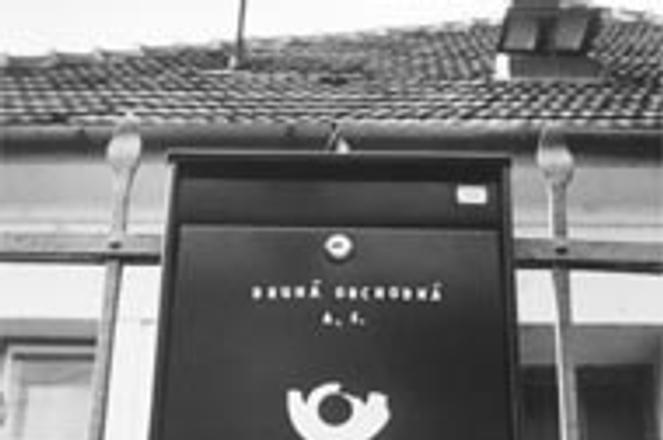Opposition parties have demanded a temporary halt to privatisation deals, like the infamous sale of the Druha obchodná firm to buyers known only by their mailbox address (above).Ján Kuchta
The Slovak Democratic Coalition, which emerged as the strongest opposition party from weekend's general elections and that is likely to lead talks on forming a new government, called on the outgoing cabinet of Premier Vladimír Mečiar not to proceed with privatisation process.
"We call on the government not to take any more privatisation decisions...and also call on foreign investors not to get involved in any such deals because these will be cancelled," said SDK deputy chairman Ľudovít Černák said on September 27.
The SDK said it would reassess, and eventually cancel, privatisation deals made during the next 30 day period until a new government is formed. The opposition party appears to have issued its warnings on the basis of experiences from March 1994, when Mečiar's second government lost a non confidence vote in parliament but the state privatisation agency, the National Property Fund (FNM), continued to approve privatisation decisions concerning large stakes in major companies. The most controversial and most criticised case was the sell-off of a controlling stake in steel producer VSŽ the night after Mečiar's government lost power.
SDK spokesman Martin Lengyel moved later on September 28 to soften Černák's statements when he said the SDK would reasses illegally made privatisation deales. "The current government has lost its mandate to carry out such deals. Investors should be careful before getting into such dubious deals, as the next government will certainly investigate them in accordance with the law," Lengyel said.
Opposition parties repeatedly warned before the elections that Mečiar's government, and its allies in the FNM, were preparing hasty privatisation deals during the period until a new cabinet takes over. Brigita Schmögnerová of the opposition Party of the Democratic Left (SDĽ) said she had information that the ruling coalition was preparing privatisation of state-controlled banks.
Despite the fact that the privatiation of Slovenská Sporiteľňa (SLSP), the largest financial institution in terms of assets and the biggest savings bank, is prohibited by law until 2003, Schmögnerová said Mečiar's government had been planning to merge SLSP with VÚB Bank and then privatise the state's stake in the merged house. National Bank of Slovakia spokesman Ján Onda said the central bank had no information about alleged privatisation of state stakes in banks. "Nothing. We are not aware of absolutely anything like this," Onda said.
SDK leader Mikuláš Dzurinda addresses reporters following strong election showing.Vladimír Hák-Profit
Foreign and domestic analysts said that any retroactive moves, such as cancelation of privatisation decisions, are generally negatively accepted by foreign investors since it decreases confidence in the security of their eventual investment. But analysts said that given Slovakia's specific circumstances, and thanks to the early warning from the potential new leading government party, there would probably be very few foreign investors who would be willing to take part in privatisation in Slovakia until a new government is sworn in.
"Retroactivity is always very unfortunate. But this is a non-standard situation and as such there can be non-standard solutions. In this case, I think, this non-standard behaviour could be justified," said an analyst at a major interntional bank in Bratislava.
"I would not be surprised to see very few foreigners willing to get involved in privatisation in the present situation in Slovakia. There have been warnings that the current government has no legitimacy to proceed in privatisation and this will be a strong factor," he added.
Analysts said the SDK warning was important mainly to prevent privatisation of leading banks - VÚB, SLSP and the insurer Slovenská Poisťovňa. Economists argued that a potentially murky and fast sell-off could hurt confidence in these financial institutions and, what is more important, undermine stability of the entire banking sector in Slovakia given the major market share of state-controlled financial houses.
"The confidence of people and investors on markets could be really hurt if they found out that large banks got into hands of people connected to the current ruling parties. The last thing Slovakia needs now is a run on big banks " a Slovak analyst who insisted on anonymity said.
All opposition parties have indicated that they are willing to privatise state property, but they stressed that the whole process must be carried out in a transparent way. They also have said that in the past that there were cases where they suspected the law was violated in privatisation deals under the Mečiar government. Such cases, they said, would be investigated and their validity put to the test.


